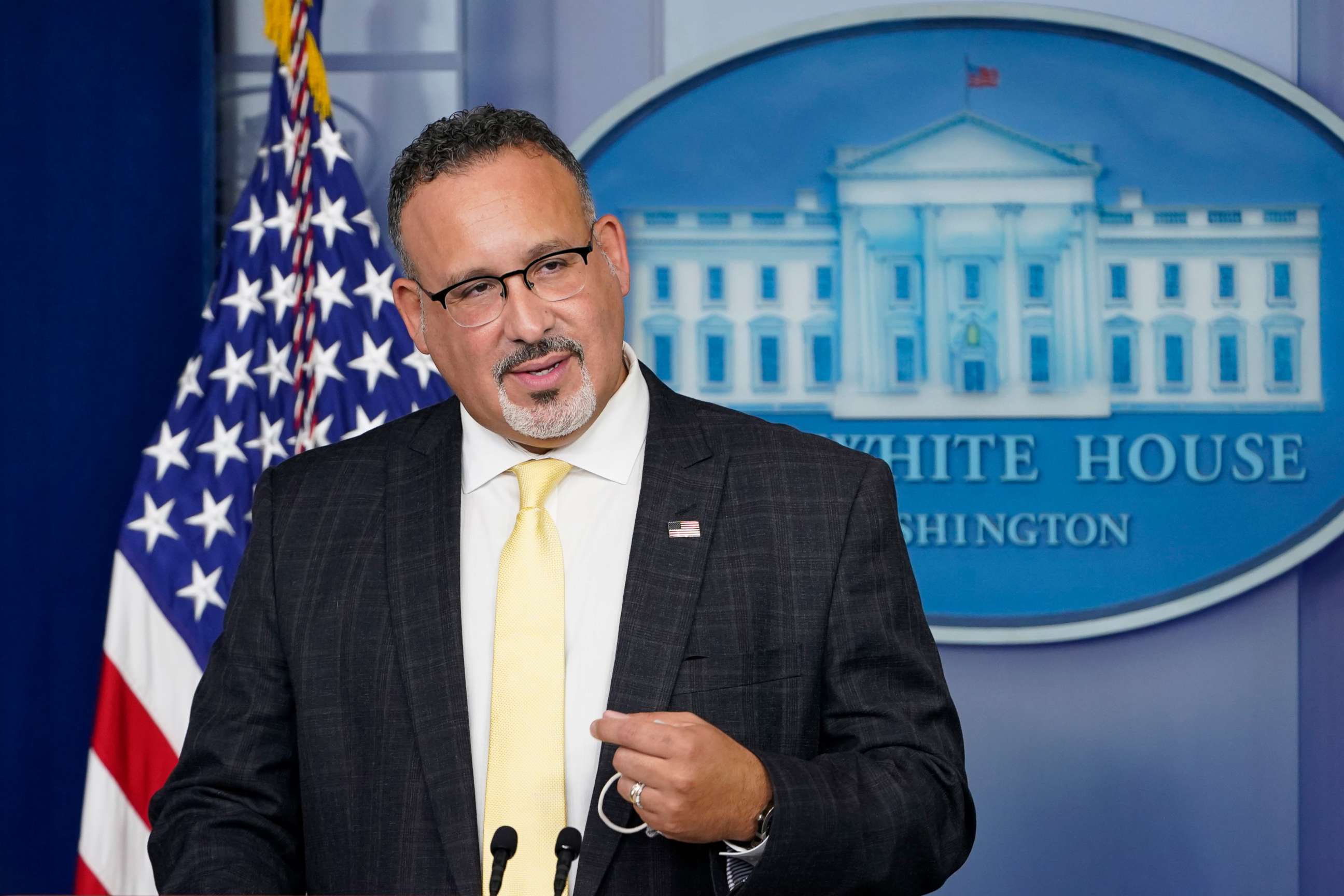Education secretary urges schools use federal funding to combat teacher shortages
In a letter Thursday, Miguel Cardona urged schools not to "waste" the chance.
The Department of Education on Thursday urged districts to combat pandemic-fueled teacher shortages by offering them more money from the pot of federal COVID-relief aid, in a letter sent to schools nationwide.
Schools are facing dire staffing losses as droves of teachers leave their posts, exhausted by the stresses of the pandemic. Education Secretary Miguel Cardona said federal money could be used to hire more substitute teachers and give permanent teachers much-needed time-off, or to offer teachers better salaries through hiring or retention bonuses.
"Let us be clear: [The American Rescue Plan] provides vital resources to hire additional educators and school staff and to improve compensation to recruit and retain educators and school staff," Cardona wrote in the letter to educators, obtained exclusively by ABC News.
"School districts should act with urgency to keep schools open for in-person learning and ensure they do not waste this opportunity to make critical investments," he said.
The American Rescue Plan, signed into law last March by President Joe Biden, provided over $122 billion to schools.
Cardona listed various ways schools could use this pot of money to improve the situation for teachers, custodians, bus drivers, school nurses and other educators, and cited schools that have already done so.

"The most common reason educators have cited for leaving school employment in the last year is stress, followed by insufficient pay," Cardona wrote.
"Many school leaders are increasing wages by offering hiring and retention bonuses, working towards permanent salary increases, or providing premium pay that help educators receive the compensation they deserve and keep them in the profession, and we encourage others to continue to work towards increasing compensation," he wrote.
Cardona cited reports of schools offering signing bonuses of up to $6,000 in California, and other financial incentives offered to new teachers in Oklahoma, North Carolina and New Jersey.
"Now, more than ever, supporting educator well-being is critical for retaining our current educators and staff," Cardona wrote.
Still, some schools have noted that short-term pay increases aren’t enough to solve their staff shortages.
Some principals have found that there are simply not enough trained professionals in the pipeline for them to recruit, and it takes time for teachers or counselors to get certified. Others have found that the temporary pay increases from federal relief are unsustainable.
And other schools have reported that nearby districts have been able to poach teachers with higher salaries funded by federal aid, leaving schools in lower-income areas with less teachers.
On the other hand, the National Education Association, a powerful teachers' union, has thrown its weight behind the policy of using federal aid to retain teachers, saying it’s been effective with educational support professionals, or ESPs, when paired with other solutions.
"ESP leaders have found that increasing pay and benefits is the top strategy," the NEA said in a post on its website.
"But what also helps is providing flexibility for retirees to return to work while still receiving pension payments, revisiting licensure challenges, providing incentives, creating cross-state collaborations to make it easier to work in other states and localities, and looking at the well-being of current staff and ways to improve it to keep them on board," the union wrote.
The NEA noted that the average salary of ESPs in 22 states is $30,000 or below, "which is not a livable wage or an attractive career proposition."
Without addressing the educator shortages, schools are facing interruptions in all facets of the school day, from longer bus routes due to less bus drivers, larger class sizes or substitute teachers who aren’t qualified for the subjects they’re assigned to, and even school closures.
Schools in 11 states — Idaho, California, Colorado, Illinois, Missouri, Michigan, New Mexico, New York, Tennessee, Vermont, and West Virginia — have had to close temporarily because of staffing shortages, according to an October report in Ed Week.
For his part, Cardona acknowledged that the short-term solutions were just the beginning, but called on schools to take advantage of what was available.
"[The Department of Education] strongly encourages you to use funding under ARP to respond to the urgent needs resulting from the pandemic while beginning to plan for the investments needed to ensure that every student has access to the qualified educators and staff they need," Cardona wrote.




